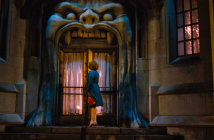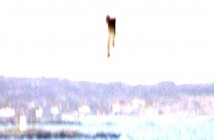Children 404 (2014)
Director: Askold Kurov, Pavel Loparev
Country: Russia
Genre: Documentary
Official Trailer: Here
Editor’s Notes: The following review is part of our coverage for the Film Society of Lincoln Center’s Making Waves Romanian Film Festival, which runs from December 4 to December 8. For more information visit FilmLinc.com and follow FilmLinc on Twitter at @FilmLinc.
In 2013, Russian President Vladimir Putin passed a bill prohibiting the “promotion of nontraditional sexual relations to minors.” Under this law, LGBT youth are considered evil, sick, and an abomination. They face constant homophobic slurs and intimidation that is entrenched and licensed in modern Russian society. Elena Klimova, a Russian journalist, started the Children 404 project as a response to this law. LGBT children send in their photos with the number 404 masking their identities. The number “404” refers to the internet’s “error – page not found” page,” and it symbolizes the Russian government’s erasure of its LGBT youth. This documentary attempts to give these repressed and silenced kids, a voice.
Filmmakers Kurov and Loparev interviewed forty-five teens in schools, the street, and their homes for their film Children 404. Some appear anonymously, brave in imparting their stories, revealing a battle they must fight from all sides: society, schoolmates, their own families, and sometimes, even their own friends. A few others courageously show themselves on camera. As they follow a handful of them throughout their day, we see them being insulted, berated, and at times, physically threatened. It seems the only thing stopping possible assaults are the filmmakers’ cameras.
Kurov and Loparev have unabashedly created an honest and important work here exposing the atrocious way the Russian government undermines its citizens.
 Pasha is a teen who decides to leave Russia to find a more tolerant life in Canada. As we watch him go to school, bullies confront him, calling him names as he silently goes about his business. To think that this young man has had to deal with that every day, but he takes it. Since his decision to leave his homeland (his family is refreshingly accepting of him), he takes on a devil-may-care attitude, growing his hair against the grain of his generally conservative schoolmates. He doesn’t hide himself, knowing full well that he’ll be leaving all that hate behind him. One particularly touching scene finds Pasha at the Lenin Memorial singing a paraphrased version of “O Canada” loud and proud as bewildered folk pass by him. Another horrifying scene has him in the city square holding up a poster endorsing tolerance as people yell invectives or directly spit on him for speaking his peace. Every moment he’s outside, the quotidian threat to his wellbeing is palpably felt. That’s how it feels to view it, imagine living with that around you every second.
Pasha is a teen who decides to leave Russia to find a more tolerant life in Canada. As we watch him go to school, bullies confront him, calling him names as he silently goes about his business. To think that this young man has had to deal with that every day, but he takes it. Since his decision to leave his homeland (his family is refreshingly accepting of him), he takes on a devil-may-care attitude, growing his hair against the grain of his generally conservative schoolmates. He doesn’t hide himself, knowing full well that he’ll be leaving all that hate behind him. One particularly touching scene finds Pasha at the Lenin Memorial singing a paraphrased version of “O Canada” loud and proud as bewildered folk pass by him. Another horrifying scene has him in the city square holding up a poster endorsing tolerance as people yell invectives or directly spit on him for speaking his peace. Every moment he’s outside, the quotidian threat to his wellbeing is palpably felt. That’s how it feels to view it, imagine living with that around you every second.
Another group of kids, rejected by their parents, meets and takes shelter with a woman in the country. She helps them because she says it’s better than suicide for these kids. She wonders how parents could ever want their children dead or maimed by suicide rather than accept them and still have them by their side. As the young lovers settle in for the night, they snapchat like many teenagers nowadays knowing full well that must face a society that doesn’t accept them for who they are.
Kurov and Loparev have unabashedly created an honest and important work here exposing the atrocious way the Russian government undermines its citizens. Through this antediluvian law, Putin sanctions bullying of his own citizens and endorses a direct danger to the most vulnerable of his country’s children. While Elena Klimova stays to fight for the right to love whom she choses, Pasha, and many others like him, must find a way to exist without their families, by leaving the homes they love.
The directors don’t interfere with their subjects, allowing the children to speak their minds and sometimes even letting very real dangers play out. One often hears about Vladimir Putin’s injustices, but Children 404 exposes them, baring a truth that cannot be ignored any longer.
Kurov and Loparev have unabashedly created an honest and important work here exposing the atrocious way the Russian government undermines its citizens.



